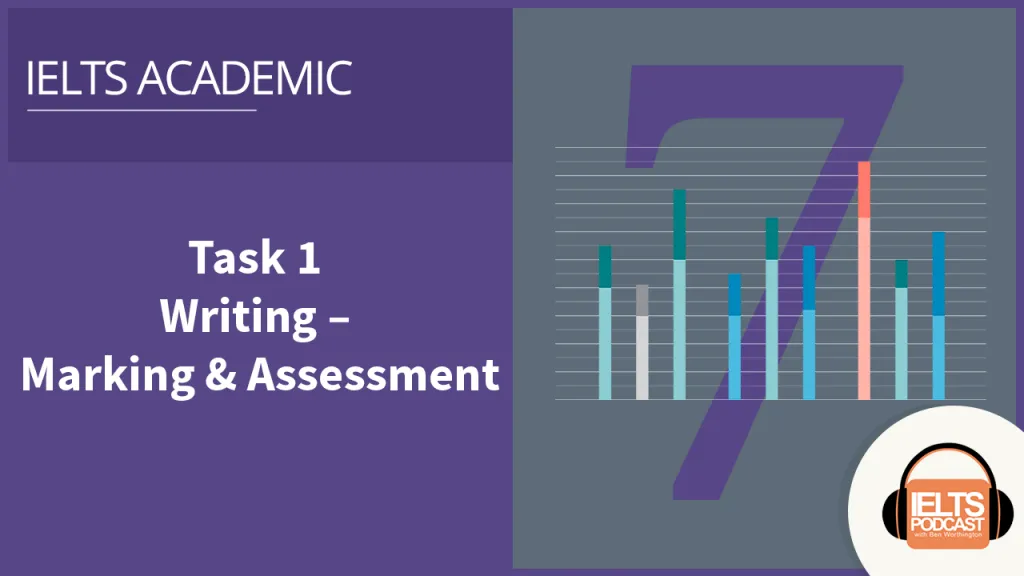
Writing marking criteria for academic task 1
In this tutorial, you will:
- become more familiar with task 1 of the IELTS academic writing test
- find out the IELTS writing marking criteria
There are two tasks in the IELTS academic writing test. You need to complete both of them, and you will have a total of 60 minutes.
For task 1 you should spend about 20 minutes on this task in your IELTS exam.
Your score for task one only contributes one-third of your total mark for the writing section.
In task 1, you will be presented with some kind of visual information, which is often in the form of one or more bar or pie charts, line graphs, tables or charts.
An example of the task instructions is:
“Summarise the information by selecting and reporting the main features and make comparisons where relevant.”
Questions involving maps, diagrams or processes are also possible, although less common.
You will be told to:
“Write at least 150 words.”
- You know that task one contributes one-third of your total mark for the writing section, you know what kinds of questions you should expect, and you know how long your response needs to be.
But do you know what the examiners are looking for when they mark task one?
Far too many candidates simply write essay after essay, or re-take the exam over and over again, and are disappointed to find that their scores fail to show improvement.
In order to achieve the best score possible for your task one, it’s essential that you have a good understanding of the marking system. You can find the writing band descriptors for task one and two on the IELTS website, www.ielts.org, and you can receive plenty of useful feedback on your writing by signing up for our online course. Recently we launched our free online IELTS writing task evaluation service. This new online service uses ai to estimate your band score and pinpoint your errors.
Another great way to prepare is to use practice questions from previous exams. Take a look at our sample academic task 1 essays.
There are four areas of assessment:
- Task achievement
- Coherence and cohesion
- Lexical resource
- Grammatical range and accuracy
These four areas are equally weighted, so each of them contributes a quarter or 25% of your total score for task 1.
Task achievement assesses how well you satisfy the requirements of the task. Essentially, you are just required to identify and report key information.
One of the key differences between achieving a band 6 and a band 7 score for task 1 is your overview. You need to ‘present a clear overview’ in order to be awarded a ‘band 7’. It is definitely worth spending time learning how to write a good overview. You also need to ‘clearly present and highlight key features’, but many IELTS candidates find it easier to get this right.
It’s also important to make sure that you write at least 150 words. Responses which are under-length will be penalised under ‘task achievement’. There is no upper word limit, but considering that you only have twenty minutes, it’s important to aim for quality rather than quantity, and you need to allow enough time to proofread and edit your essay.
The second area of assessment is coherence and cohesion. Examiners are trained to evaluate how well you have organised the information. In order to be awarded a band 7, for example, you need to ‘organise information logically’ and there needs to be ‘a clear progression’ throughout your essay.
The most logical way to organise a task one essay is:
Paragraph One – Introduction
Paragraph Two – Overview
Paragraphs Three and Four – Details
Even though you only have twenty minutes to complete task one, resist the temptation to start writing your response immediately. Minimal planning is needed if you follow the outline above but take a minute to make sure that you have understood the question.
As you might expect, achieving higher scores for ‘lexical resource’ and ‘grammatical range and accuracy’ demands more sophisticated and correct use of language and, again as you might expect, there is no ‘quick fix’ to improve in these areas.
One point worth noting is the importance of natural use of language. The assessment criteria for a band 7 score for ‘lexical resource’ include a focus on ‘awareness of style and collocation’. When you are learning IELTS vocabulary, don’t just learn words in isolation.
Pay attention to common collocations – words which are used together frequently in natural English, such as ‘enrich, extend, expand or widen’ your vocabulary! Collocation dictionaries can be a great resource to help you with this.
Now that you have a better understanding of what the examiners are looking for, you should be in a better position to deliver it.
Audio tutorial
You can download or listen to the audio version here:
|Direct Download Here | Stitcher | iTunes | Spotify | Soundcloud | Transcript |
Podcast: Play in new window | Subscribe: RSS
Have a look at more tutorials to help you with academic task 1:
If you need some sample essays and questions, check out these resources :
